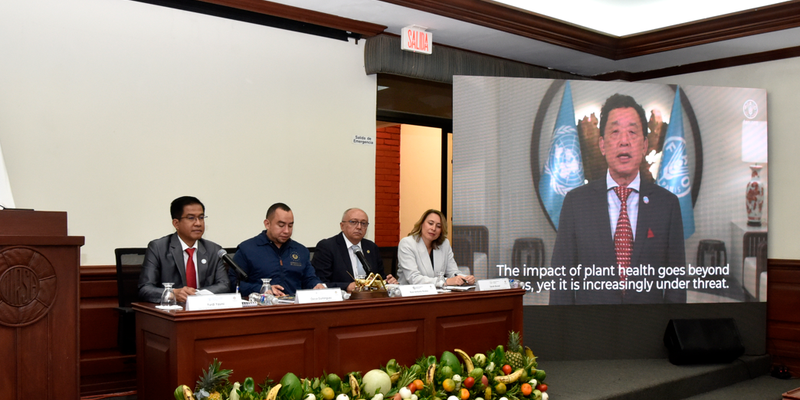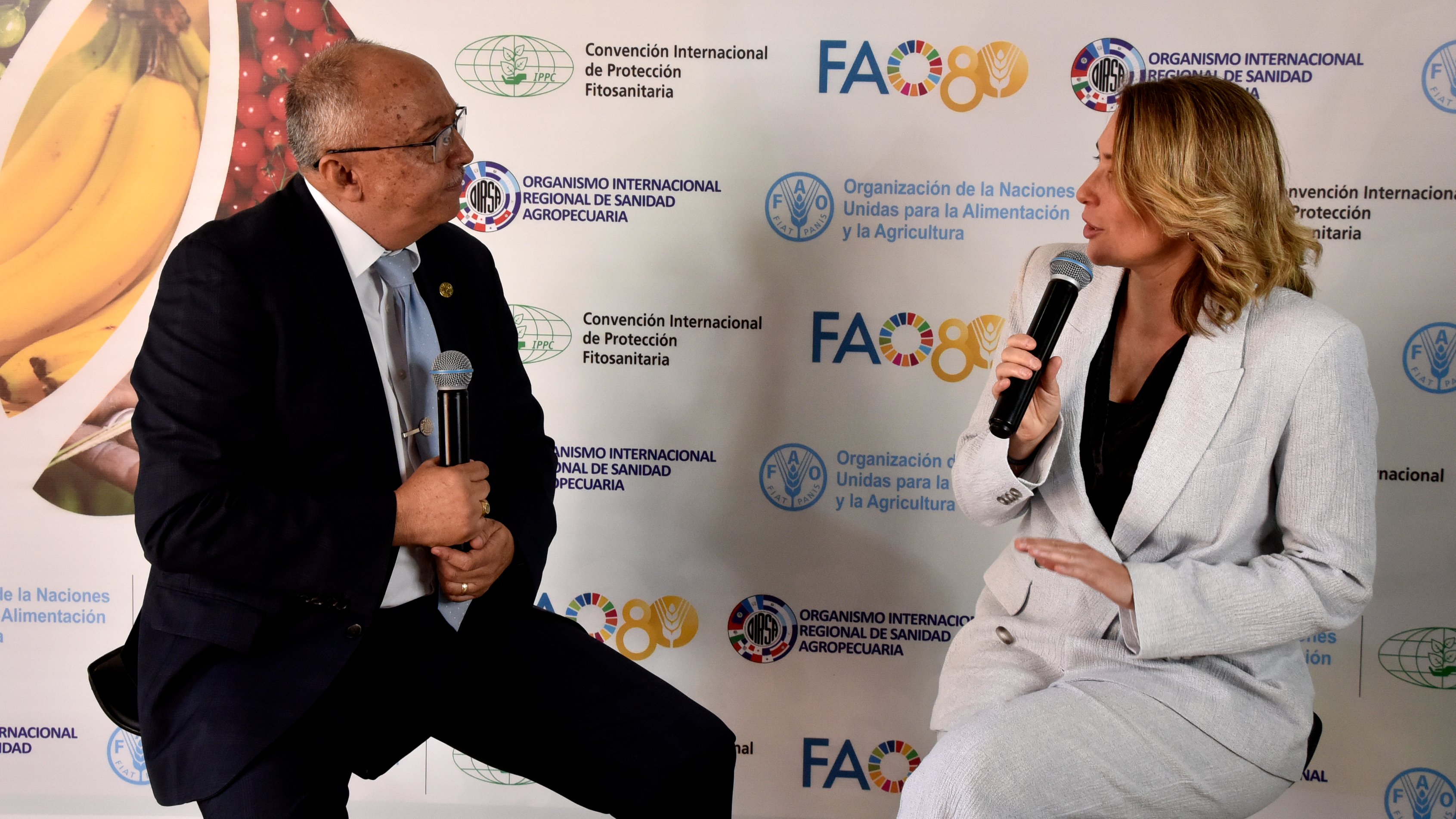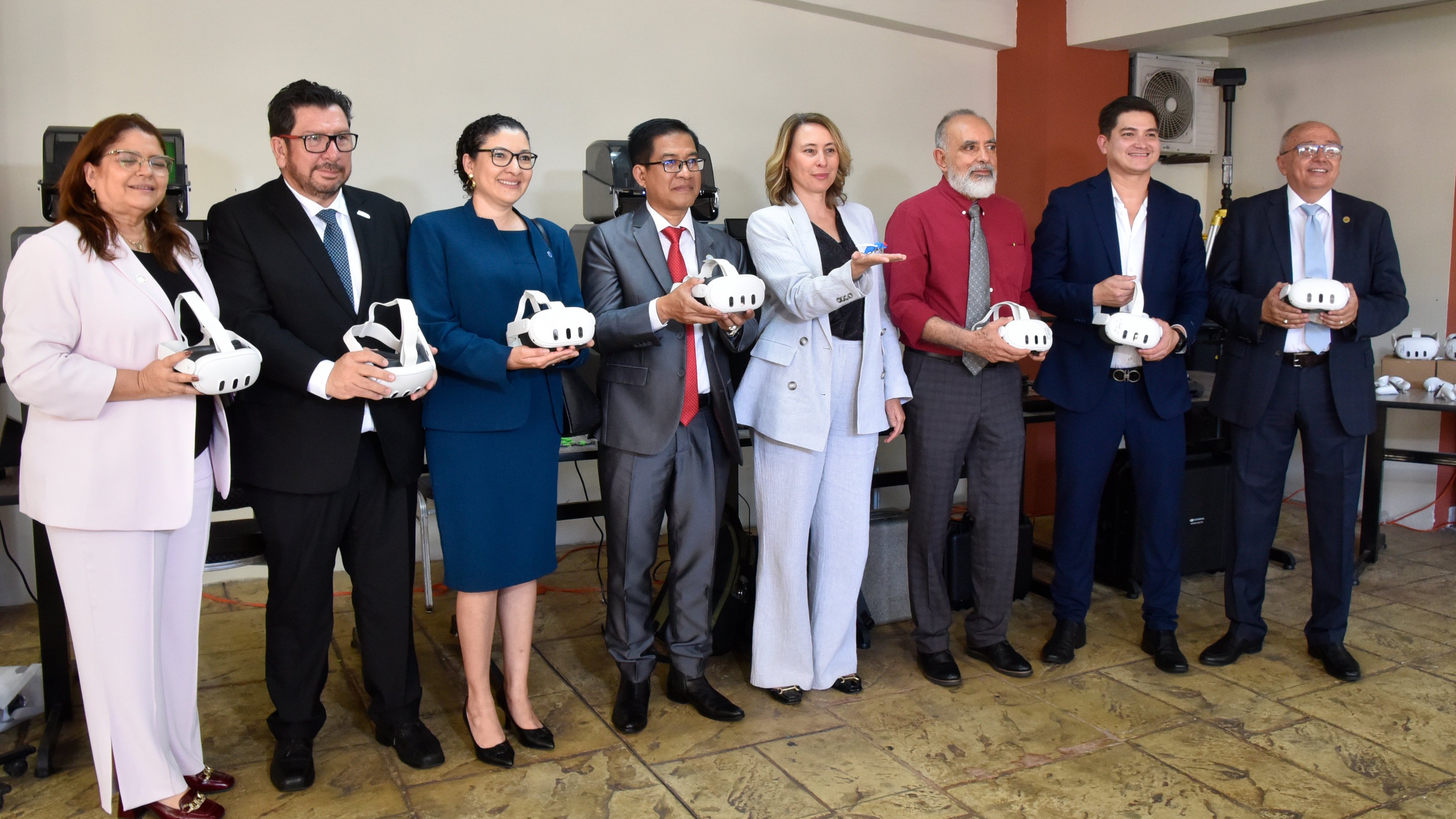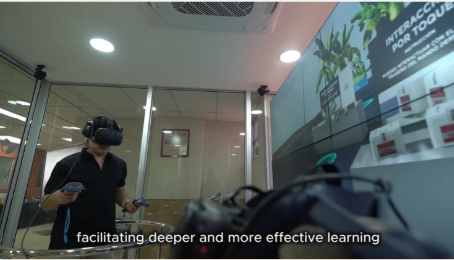La Journée internationale de la santé des végétaux 2025 met à l’honneur le rôle crucial des végétaux dans l’approche «Une seule santé»
Posted on mar, 20 Mai 2025, 08:12

© OIRSA
San Salvador, 12 mai 2025 – L’Organisation des Nations Unies pour l’alimentation et l’agriculture (FAO) et la Convention internationale pour la protection des végétaux (CIPV) se sont jointes à la communauté internationale pour célébrer la Journée internationale de la santé des végétaux, le 12 mai à San Salvador (El Salvador). Cet événement de haut niveau, organisé au format hybride par l’Organisme international régional de santé végétale et animale (OIRSA), a rassemblé plus de 800 participants en ligne et en présentiel.
Pourquoi la santé des végétaux est-elle essentielle?
La Journée internationale de la santé des végétaux est une occasion privilégiée de sensibiliser à l’importance de protéger les végétaux afin de contribuer à l’élimination de la faim, à la réduction de la pauvreté, à la préservation de la biodiversité et de l’environnement, ainsi qu’à la prospérité économique. Le thème de cette année, «L’importance de la santé végétale dans l’approche "Une seule santé”», souligne l’interdépendance entre les santés humaine, animale, environnementale et végétale.
«Lorsque nous protégeons la santé des végétaux, nous préservons la sécurité alimentaire, la biodiversité, ainsi que le bien-être des populations et de la planète», a déclaré QU Dongyu, Directeur général de la FAO, dans un message vidéo diffusé lors de la cérémonie d’ouverture de l’événement de haut niveau. «Cette année, la FAO célèbre son 80ᵉ anniversaire – huit décennies consacrées à la réalisation d’un monde sans faim – et la santé des végétaux est au cœur de cette mission», a-t-il ajouté.
Le Directeur général a souligné le rôle de la FAO dans le soutien aux pays, notamment à travers l’élaboration et la mise en œuvre de normes phytosanitaires, le renforcement des capacités aux niveaux national et régional, le recours aux technologies de pointe et à l’innovation, ainsi que la mise en place de partenariats.
Parmi les intervenants figuraient Oscar Dominguez, Vice-Ministre de l’agriculture et de l’élevage du Salvador, Elena Suazo Torres, Secrétaire d’État à l’agriculture et à l’élevage du Honduras, Raúl Antonio Rodas Suazo, Directeur exécutif de l’OIRSA, et Emilia González, Représentante adjointe de la FAO au Salvador. Dans son message vidéo, la lauréate du prix Nobel de la paix Rigoberta Menchú Tum a souligné le rôle déterminant joué par les communautés autochtones dans la préservation de la santé des végétaux. La modération de l’événement a été assurée par Yurdi Yasmi, Directeur de la Division de la production végétale et de la protection des plantes de la FAO.
 |  |
© OIRSA
L’innovation au service de la santé des végétaux
Les spécialistes de la santé des végétaux ont souligné le rôle des végétaux dans l’approche «Une seule santé» et ont montré comment l’innovation technologique et la recherche scientifique contribuent à la préservation de la santé des végétaux. L’OIRSA, organisation régionale de la protection des végétaux et partenaire de longue date de la FAO et de la CIPV, a présenté la première salle de simulation 3D au monde dédiée à la gestion des foyers d’organismes nuisibles. Mise au point en collaboration avec la Banque interaméricaine de développement, cette salle recourt à l’intelligence artificielle et à des équipements de pointe (casques de réalité virtuelle, ordinateurs, logiciels spécialisés et manettes) pour former les spécialistes des questions phytosanitaires dans des environnements virtuels sécurisés, en leur proposant des expériences immersives simulant des scénarios réels d’apparitions de foyers.
Cette formation basée sur la réalité virtuelle permet aux experts phytosanitaires de recréer des scénarios d’apparitions de foyers d’organismes nuisibles, d’évaluer leur dissémination et de tester des stratégies d’enrayement et d’éradication dans un environnement sûr et maîtrisé. Elle renforce leur capacité à réagir rapidement et avec précision en cas d’urgence, à optimiser les ressources, à protéger la production agricole, les écosystèmes et la santé publique, ainsi qu’à renforcer les capacités techniques des organisations nationales de la protection des végétaux. (Voir ici une démonstration de la simulation 3D). Parmi les autres innovations présentées par l’OIRSA figurent le projet Moscamed, dédié à la lutte contre les mouches des fruits, le recours aux drones pour la surveillance et la pulvérisation, l’impression 3D, les services de fumigation et les unités cynotechniques.
 |  |
Captures d’écran de la vidéo montrant le fonctionnement de la salle de simulation 3D
«En présentant les dernières innovations et les technologies de pointe dans les domaines de la production et de la protection des végétaux, l’OIRSA entend encourager les autres pays de la région à adopter ces technologies pour protéger la santé des végétaux», a déclaré Raúl Antonio Rodas Suazo, Directeur exécutif de l’OIRSA.
Sarah Brunel, responsable des affaires courantes du Secrétariat de la CIPV, a présenté le Campus de la CIPV sur la santé des végétaux. Mis en place avec l’Académie numérique de la FAO et soutenu par l’Union européenne, ce campus propose des formations multilingues, gratuites et certifiées, ainsi que des guides et outils de la CIPV, afin de renforcer les connaissances et compétences des professionnels de la santé des végétaux partout dans le monde. Ces cours, élaborés par des experts internationaux, permettent un apprentissage autonome.
Shoki Al-Dobai, responsable de l’équipe de la FAO chargée des acridiens, ravageurs et maladies transfrontalières des végétaux, a évoqué les innovations technologiques dans la lutte contre les criquets ayant un impact sur le plan économique.
Ghislain Tepa-Yotto, de l’Institut international d’agriculture tropicale d’Ibadan (Nigéria), a présenté les bases scientifiques du lien entre la santé des végétaux et l’approche «Une seule santé».
Dans son exposé intitulé «L’importance de l’anthropologie pour la santé des végétaux: le crépuscule des insectes», Luis Arrioja, recteur du Collège de Michoacán (Mexique), a souligné la nécessité d’articuler les sciences sociales et humaines avec les sciences naturelles pour mieux comprendre et traiter les enjeux liés à la santé des végétaux.
Lors de cet événement de haut niveau, Spyridoula Dimitropoulou a été désignée lauréate du concours vidéo 2025 de la Journée internationale de la santé des végétaux, organisé par le Réseau européen de coordination de la recherche dans le domaine phytosanitaire (Euphresco), pour sa vidéo intitulée «Sauver les platanes de Grèce: l’utilisation des technologies numériques pour la détection de Ceratocystis platani». La CIPV et l’Euphresco collaborent depuis trois ans pour promouvoir la recherche dans le domaine phytosanitaire par le biais de ce concours annuel.
La Journée internationale de la santé des végétaux célébrée dans le monde entier
Visites de haut niveau, actions de sensibilisation, webinaires, articles de presse, déclarations ministérielles, billets de blog, campagnes sur les réseaux sociaux, entretiens dans les médias et expositions, la Journée internationale de la santé des végétaux 2025 a mis en lumière les avancées scientifiques et technologiques notables dans le domaine phytosanitaire et la forte mobilisation internationale, et a aussi réaffirmé l’importance d’un engagement collectif en faveur de la santé des végétaux.
Pour aller plus loin:
Page web de la Journée internationale de la santé des végétaux
Vidéo: La santé végétale et l’approche «Une seule santé»
Vidéo: Activités organisées par El Salvador à l’occasion de la Journée internationale
Interview de Sarah Brunel et Carlos Urias à la télévision salvadorienne

